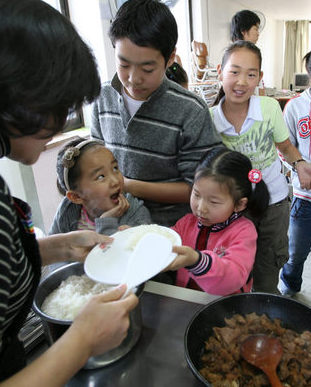Posted on : Nov.10,2006 13:18 KST
Modified on : Nov.11,2006 11:36 KST
 |
|
Migrant workers' children wait in line for their meals at a after-school center in Seoul.
|
But illegal workers still not officially included in local programs
At a daycare program in Seoul, the smell of cooked rice permeates the air. The eyes of the children there reflect their hunger. At lunchtime on November 9, the children, their parents Mongolian migrant workers, enjoy a warm meal of steamed pork and rice.
Each month, it costs the Seongdong-gu Office about 3 million won (US$3,200) to feed 50-60 children each day, but if the program does not provide the food, the children, aged five to 19, will have to go without a meal or eat alone at home. The school was originally an after-school center for the children of migrant workers, but it has opened its doors all day to the children of migrant workers, teaching them such subjects as the Korean language and providing them with warm meals.
The problem of poorly-fed children is widespread among families of migrant workers. Parents work long hours, and their children either go without meals or are undernourished, relying on instant food.
A 15-year-old Mongolian girl is plagued with vomiting spells, as she has a stomach ulcer. But her mother cannot provide her with special meals because she must work long hours at a clothing factory in Seoul. So the daughter eats mainly bread or instant noodles as every meal. She has since joined the school meal program.
A 11-year-old girl, whose parents are illegal migrant workers, does not see her mother at mealtimes. Her mother comes home late every night due to her work schedule, so the girl and her two sisters eat together. She enjoys a meal at the special school program; she is noticeably shorter than her classmates.
With concerns about poorly-fed children of migrant workers growing, some local governments in Seoul are taking steps to support these children. In late August of this year, the Ministry of Government Administration and Home Affairs ordered local governments to support migrant workers as members of the local community; previously, the migrant workers received very little support from such programs, regardless of their legal status.
However, illegal migrant workers are still officially excluded from the support program. The ministry called upon local governments to guarantee the "basic human rights" of such workers through working together with civic groups.
Kim Hyeong-gon, an official at Seoul’s Seongdong-gu Office, said, "In terms of illegal migrant workers, it’s difficult to figure out who has poorly-fed children, because these workers don’t want to expose their identities."
Starting this month, the Seongdong-gu Office began providing meals for some 60 children of migrant workers. In addition, the ward office plans to begin an on-site investigation to take a census of the children of migrant workers. Officials in the office just ask about alimentary needs, without questioning the workers or their children regarding legal matters. Another ward office in Seoul will join the move to fund a similar school in Seoul.
Hwang Tae-kyeong, 40, an official at an after-school center for migrant workers, said, "It’s heartbreaking to see migrant workers’ children learning a harsh reality at such a young age. If the government sets up a support program [without the threat of legal action against illegal immigrant workers], we will be able to give these children more help by sharing information with civic groups."
[englishhani@hani.co.kr]

